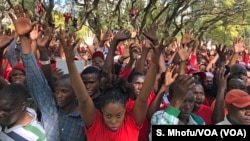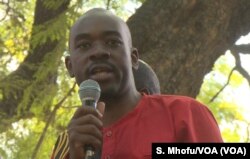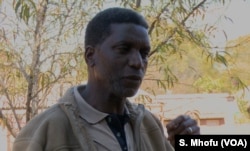Zimbabwe’s opposition parties took to the streets Wednesday, demanding the country’s election regulators release voter rolls to be used in the July 30 general election.
Thousands joined Nelson Chamisa, the leader of the Movement for Democratic Change-MDC-Alliance and marched to the offices of the Zimbabwe Electoral Commission. They held placards denouncing the commission and accusing it of rigging for the ruling ZANU-PF party to win. After a meeting with the commission, Chamisa explained the opposition’s demands.
“The ballot paper has to be done in a transparent manner. We must agree, we must observe. We must be accountable and open. The issue of the voters' roll in terms of the law. We must have a biometric voters' roll with pictures with everything as per the law,” he said.
The 40-year-old politician told his supporters that the opposition would permanently camp out at the Zimbabwe Electoral Commission if the ZEC does not give in to their demands.
The opposition wants the electoral body to release the actual voter roll so it can be checked for ghost voters.
Political commentator Rejoice Ngwenya says Zimbabwe risks more protests and another disputed election if the electoral commission does not release the roll and ballot paper as per opposition demands.
“They [the opposition] are creating a dossier of challenging the credibility of the results because if there is going to be an electoral court, those that are aggrieved will simply say we are not happy. We do not believe the results are reflecting the expression of the people. These are the things that have to be catalogued that can be basis for litigation. I believe that the integrity is already under question. This demonstration can be catalogued together with other cases to say this election process has been totally unfree, unfair and not credible,” said Ngwenya.
Under former President Robert Mugabe’s almost-four-decade-long rule, which ended last November, elections were always disputed. His successor, Emmerson Mnangagwa, has promised a credible election by allowing Western observers. The opposition says that is not enough.






